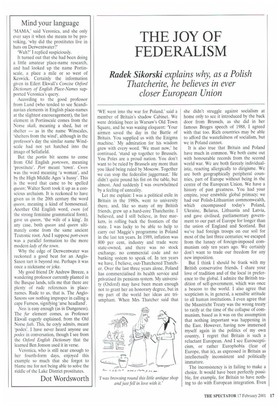Mind your language
'MAMA,' said Veronica, and she only ever says it when she means to be provoking, 'why did the prostitutes live in huts on Derwentwater?'
'Wuh?' I replied suspiciously.
It turned out that she had been doing a little amateur place-name research, and had looked up the name Portin scale, a place a mile or so west of Keswick. Certainly the information
given in Eilert Ekwall's Concise Oxford Dictionary of English Place-Names supported Veronica's query.
According to the good professor from Lund (who tended to see Scandi navian elements in English place-names at the slightest encouragement), the last element in Portinscale comes from the Norse skali, meaning a shed, hut or
shelter — as in the name Winscales, 'shelters from the wind', although in the
professor's day the similar name Windscale had not yet hatched into the imago of Sellafield.
But the portin bit seems to come from Old English portcwen, meaning 'prostitute'. Port meant 'town'. Cwen was the word meaning 'a woman', and by the High Middle Ages 'a hussy'. This is the word that came to be spelled quean: Walter Scott took it up as a conscious archaism. It is reckoned to have given us in the 20th century the word queen, meaning a kind of homosexual, Another Old English word, cwen (of the strong feminine grammatical form),
gave us queen, 'the wife of a king'. In any case, both quean and queen ulti
mately come from the same ancient Teutonic root. And I suppose port -cwen was a parallel formation to the more modern lady of the town.
Why the edge of Derwentwater was reckoned a good beat for an AngloSaxon tart is beyond me. Perhaps it was once a nickname or joke.
My good friend Dr Andrew Breeze, a wandering professor currently planted in the Basque lands, tells me that there are plenty of rude references in placenames. Rude to us, that is. The AngloSaxons saw nothing improper in calling a cape Furness, signifying 'arse headland'.
Ness is easy enough (as in Dungeness). The _fur element comes, as Professor Ekwall eagerly explained, from the Old Norse futh. This, he coyly admits, meant 'podex'. I have never heard anyone use podex in conversation, though I see from the Oxford English Dictionary that the learned Ben Jonson used it in verse.
Veronica, who is still near enough to her fourth-form days, enjoyed this example so much that she forgot to blame me for not being able to solve the riddle of the Lake District prostitutes.
Dot Wordsworth


































































 Previous page
Previous page